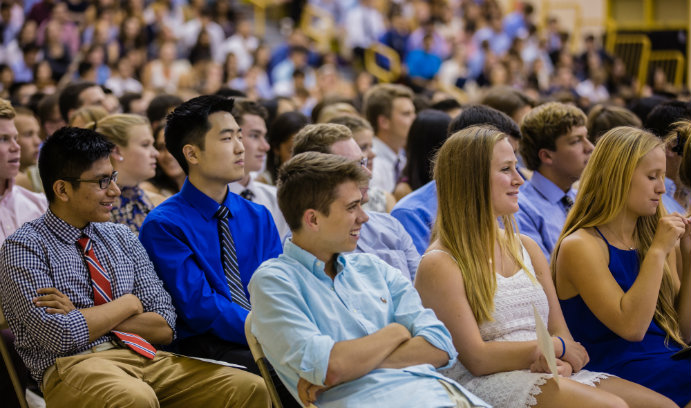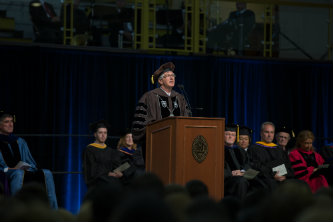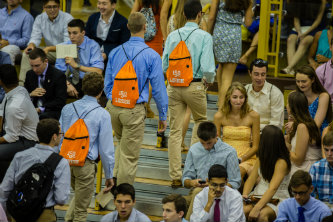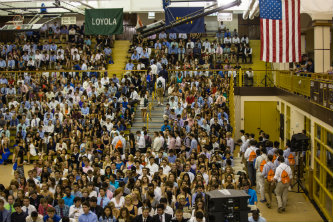‘How will you choose your path?’

The Class of 2019 is formally welcomed to Lehigh at the University Convocation.
Chatter among newly acquainted classmates became hushed as the joyful music of Mainstreet Brass filled Grace Hall for this year’s University Convocation, the Class of 2019’s formal induction into the Lehigh community.
The Sunday evening program and official start of the academic year featured remarks from President John Simon. Simon, who assumed the presidency in July, reminded students that they share something important in common: “We’re all first-years.”
“I’ve been on the job for less than two months, so we’re beginning this adventure together,” said Simon. “I’m confident that we will all find we have made the right decision.”
John Smeaton, vice provost for student affairs, welcomed students to the Lehigh family.
“Lehigh is a community,” said Smeaton. “It is your community, where you will live and learn for the next four years. As you embark on this journey, please know that my student affairs colleagues and I are here to help you make the most of your Lehigh experience.”
Smeaton challenged students to develop both academically and personally.
“I want each of you to pledge that in your words and your deeds, you will demonstrate respect, genuine respect for yourself and for those around you,” said Smeaton. “In so doing, you will enrich your own experience and enhance the quality of campus life.”
Smeaton presented Provost Pat Farrell with a book signed by all members of the Class of 2019, affirming their commitment to the Student Senate Statement on Academic Integrity. Farrell called the book “an important indication of your start here at Lehigh.”
Farrell offered students three pieces of advice as they began their academic careers at Lehigh. First, he said, students should try something new and challenge themselves at least once per semester.
“We’re going to challenge you—trust me,” said Farrell. “But one of the most important people to get on board with challenging you is yourself. Find ways to challenge yourself.”
Students should also, said Farrell, ask for help.
“Find people who want to help you,” said Farrell. “We’re going to do everything we can to help you succeed. You, of course, are going to do all the work. Don’t be shy about looking for people who can help you and answer questions, who can help you get over things that are academically difficult, socially difficult, [or] otherwise difficult. That’s what a university is for.”
Lastly, Farrell offered a “very Lehigh-centered” piece of advice, based on the university’s focus on theory to practice.
“We expect that you’re going to earn a Lehigh degree, and in the process of earning that degree you develop the talent, the outlook, the attitude, the approaches that are going to take you well beyond anybody else with a degree into being a leader for the community, for your state, for the nation, for the world,” said Farrell. “Start thinking now about how what you do at Lehigh is going to turn into practice. Don’t wait four years to begin that practice. You can start tomorrow.”
Farrell closed with words of encouragement.
“This is a challenging place. It’s supposed to be a challenging place,” said Farrell. “I’m confident that you all can not only meet that challenge, but in fact you will find some really great, great experiences here at Lehigh, both academic and non-academic. So have a wonderful academic year.”
'Go out into the world and do something.'
Farrell introduced Simon, whose observation of a special distinction of the Class of 2019 was met with cheers.
“Lehigh University is celebrating 150 years of excellence in education,” said Simon. “Four years from now, you will be our 150th graduating class, and I predict this special status will also confer upon your class four wins against Lafayette in football.”
Simon noted that he, like the members of the Class of 2019, was born into a generation that faced a domestic and global challenges.
“Fortunately,” said Simon, “my parents believed—and so did yours—that education was the most important gift they could give their children, and that education was the key to addressing the challenges faced by the world. I stand before you, thoroughly convinced of the power of education, and you are about to embark on a wonderful experience at a great institution. But what will you make of that experience and how will you choose your path?”
Noting his affinity for 1970s music, Simon quoted lyrics from “I’d Love to Change the World,” a popular song by the group Ten Years After: “‘I’d love to change the world, but I don’t know what to do, so I’ll leave it up to you.’”
“You’re at Lehigh because this is decidedly not your motto,” said Simon. “You’re here to learn, to explore, and to go out in the world and lead. This was Asa Packer’s vision for students when he founded Lehigh, it’s the community you have chosen to join, and I think the most succinct expression of this theme was made by a very famous Lehigh alum, Lee Iacocca, who said the following: ‘Apply yourself, get all the education you can, and then, by God, do something. Don’t just stand there. Make it happen.’”
Simon urged students to push themselves out of their comfort zones and take advantage of the wide array of opportunities and privileges available at Lehigh.
“I encourage each and every one of you to break out, to find your own voice, to prepare yourself to go out into the world and do something,” said Simon.
'Take advantage. Take some risks.'
Keynote speaker Rick Weisman, professor of civil and environmental engineering, shared what he’s learned in his nearly 40 years as a Lehigh faculty member.
Weisman quoted Irish poet William Butler Yeats to illustrate the responsibilities of students and the university.
“[Yeats said], ‘Education is not the filling of a pail, but the lighting of a fire.’ ... Our job is to encourage an intellectual fire in you,” said Weisman. “Yeats also said, ‘Do not wait until the iron is hot. Make it hot by striking.’ That’s your job. You have to take the initiative. There are a lot of opportunities here at Lehigh: academic, social, professional, cultural. Take advantage, take some risks.”
Weisman spoke of the need for students “get calibrated” upon their arrival at the university—to adjust to living and learning in a community high-achievers and to understand that academic struggles don’t necessarily impede success.
“I want you to live a useful life,” said Weisman. “Don’t ask me to define that phrase for you. ... We have to define it for ourselves. But I do know that someday you’re going to have to go out and earn a living for yourself. You’ll have to be useful to yourself. You have to be useful to an employer, to employees, to your family, to your community. Every day, say to yourself ‘I’m here at Lehigh so I can become an adult that leads a useful life.’ That may help with decisions along the way.
“So I wish you well. I encourage you to take advantage of the many opportunities at Lehigh. Knock on doors and knock again—you’ll be transformed.”
Photos by Christa Neu
Posted on:




